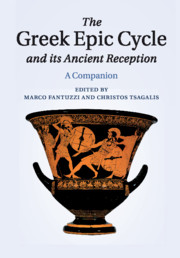Book contents
- Frontmatter
- Contents
- List of illustrations
- List of contributors
- Editorial note
- Introduction: Kyklos, the Epic Cycle and Cyclic poetry
- PART I APPROACHES TO THE EPIC CYCLE
- PART II EPICS
- PART III THE FORTUNE OF THE EPIC CYCLE IN THE ANCIENT WORLD
- 22 The aesthetics of sequentiality and its discontents
- 23 The Epic Cycle, Stesichorus, and Ibycus
- 24 Pindar's Cycle
- 25 Tragedy and the Epic Cycle
- 26 The Hellenistic reception of the Epic Cycle
- 27 Running rings round Troy: Recycling the ‘Epic Circle’ in Hellenistic and Roman art
- 28 Virgil and the Epic Cycle
- 29 Ovid and the Epic Cycle
- 30 Statius' Achilleid and the Cypria
- 31 The Epic Cycle and the ancient novel
- 32 The Epic Cycle and imperial Greek epic
- Works cited
- Index of principal passages
- Index nominum et rerum
32 - The Epic Cycle and imperial Greek epic
from PART III - THE FORTUNE OF THE EPIC CYCLE IN THE ANCIENT WORLD
Published online by Cambridge University Press: 05 August 2015
- Frontmatter
- Contents
- List of illustrations
- List of contributors
- Editorial note
- Introduction: Kyklos, the Epic Cycle and Cyclic poetry
- PART I APPROACHES TO THE EPIC CYCLE
- PART II EPICS
- PART III THE FORTUNE OF THE EPIC CYCLE IN THE ANCIENT WORLD
- 22 The aesthetics of sequentiality and its discontents
- 23 The Epic Cycle, Stesichorus, and Ibycus
- 24 Pindar's Cycle
- 25 Tragedy and the Epic Cycle
- 26 The Hellenistic reception of the Epic Cycle
- 27 Running rings round Troy: Recycling the ‘Epic Circle’ in Hellenistic and Roman art
- 28 Virgil and the Epic Cycle
- 29 Ovid and the Epic Cycle
- 30 Statius' Achilleid and the Cypria
- 31 The Epic Cycle and the ancient novel
- 32 The Epic Cycle and imperial Greek epic
- Works cited
- Index of principal passages
- Index nominum et rerum
Summary
The Greek world from the third to the sixth century AD enjoyed a rich and continuous production of hexameter poetry, ranging from the didactic poems Halieutica and Cynegetica (second century AD) by the two Oppians, Quintus of Smyrna's large-scale Posthomerica and Triphiodorus' small-scale Capture of Troy (third century AD), to Nonnus of Panopolis' gargantuan Dionysiaca (fifth century AD), as well as those poets who are indebted to Nonnus and are therefore often (however inappropriately) called his ‘disciples’ (e.g. Musaeus, Colluthus, or Christodorus of Coptos; fifth/sixth century AD). In addition to this, mention has also to be made of the multitudinous (longer and shorter) fragments of hexameter poems of various lengths and sorts which were not transmitted through our mediaeval manuscript tradition, but are known to us only via papyri and parchment, most of them preserved in the deserts of Egypt. Finally, we also have to think of those epics which are entirely lost to us now, such as Nestor of Laranda's Metamorphoses, his son's Pisander of Laranda's Ἡρωϊκαὶ θεογαμίαι ‘Heroic Marriages of the Gods’, or Scopelianus’ Gigantia.
When considering the possible influences of the poems of the Epic Cycle upon the hexameter poetry of the imperial period, we must therefore, first and foremost, bear in mind that the poems with which we will be dealing represent only a small section of an extremely diversified and rich poetic production, within which the Trojan saga played a doubtlessly important, but by no means singular, role. At the same time, however, even those texts which re-enact the Trojan saga were numerous, and only a small fraction of them has survived, whereas much textual material is lost or available to us only in fragments. Further, essentially three caveats have to be expressed with regard to the potential engagement of later epic with the Cyclic poems. First, the date of the Cycle's loss is still a moot point, depending, inter alia, on the dating and/or identification of Proclus (the author of the Cycle's prose summaries), and the assessment of Ioannes Philoponus' notice that the Cycle was no longer available at the time of Pisander of Laranda (viz. the third century AD; cf. Epicus Cyclus T 2 D.).
- Type
- Chapter
- Information
- The Greek Epic Cycle and its Ancient ReceptionA Companion, pp. 604 - 622Publisher: Cambridge University PressPrint publication year: 2015
- 1
- Cited by



